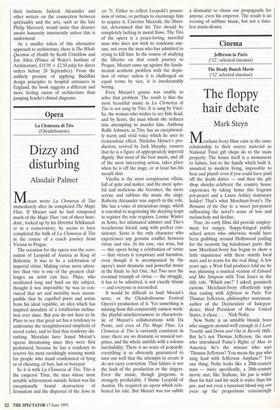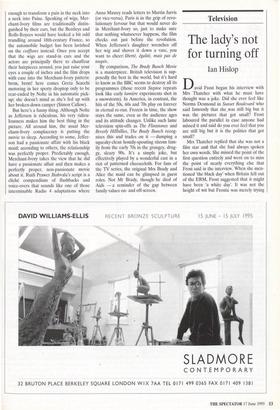Cinema
Jefferson in Paris (`12', selected cinemas) The Brady Bunch Movie (`12' selected cinemas)
The floppy hair debate
Mark Steyn
Merchant-Ivory films exist in the same relationship to their source material as National Trust gift shops do to the main property. The house itself is a monument to failure, lost to the family which built it, unsuited to modern living, impossible to heat and plumb even if you could have paid off the death duties — and then the gift shop shrieks: celebrate the country house experience by taking home this fragrant pot-pourri and a Laura Ashley stationary holder! That's what Merchant-Ivory's The Remains of the Day is: a sweet pot-pourri suffocating the novel's sense of loss and melancholy and decline.
True, its early films did provide employ- ment for rangey, floppy-fringed public school actors who otherwise would have been grubbing around Hollywood jostling for the neurotic fag hairdresser parts. But now Merchant-Ivory has begun to show a little impatience with these strictly local stars and to yearn for the real thing. A few years ago, a West End producer told me he was planning a musical version of Edward and Mrs Simpson with Tom Jones in the title role. `Which one?' I asked, genuinely curious. Merchant-Ivory effortlessly tops that casting with Jefferson in Paris. For Thomas Jefferson, philosopher statesman, author of the Declaration of Indepen- dence, third President of these United States, it chose . . . Nick Nolte.
Now Nolte is an amiable blonde bozo who staggers around well enough in I Love Trouble and Down and Out in Beverly Hills. But he's not Thomas Jefferson, the man who introduced Paine's Rights of Man to America; he's the wiseass who says `Thomas Jefferson? You mean the guy who sang lead with Jefferson Airplane?' For one thing, Nolte looks like a 20th-century man — more specifically, a 20th-century movie star; like Stallone, his jaw is wider than his hair and his neck is wider than his jaw, and not even a luxuriant blond wig can even up the proportions convincingly enough to transform a pain in the neck into a neck into Paine. Speaking of wigs, Mer- chant-Ivory films are traditionally distin- guished by their cars, but the Bentleys and Rolls-Royces would have looked a bit odd trundling around 18th-century France, so the automobile budget has been lavished on the coiffures instead. Once you accept that the wigs are stand-in cars and the actors are principally there to chauffeur their hairpieces around, you just raise your eyes a couple of inches and the film drops with ease into the Merchant-Ivory pattern: brrm, brrm! here comes Greta Scacchi motoring in her sporty droptop only to be rear-ended by Nolte in his automatic pick- up; she doesn't mind as she's fed up with her broken-down camper (Simon Callow).
But here's a funny thing. Although Nolte as Jefferson is ridiculous, his very ridicu- lousness makes him the best thing in the picture. All around him, the usual Mer- chant-Ivory complacency is putting the movie to sleep. According to some, Jeffer- son had a passionate affair with his black maid; according to others, the relationship was perfectly proper. Predictably enough, Merchant-Ivory takes the view that he did have a passionate affair and then makes a perfectly proper, non-passionate movie about it. Ruth Prawer Jhabvala's script is a cliché compendium of flashbacks and voice-overs that sounds like one of those interminable Radio 4 adaptations where Anna Massey reads letters to Martin Jarvis (or vice-versa). Paris is in the grip of revo- lutionary fervour but that would never do in Merchant-Ivory so, just to make sure that nothing whatsoever happens, the film checks out just before the revolution. When Jefferson's daughter wrenches off her wig and shoves it down a vase, you want to cheer: liberte, dgalite, mais pas de toupee.
By comparison, The Brady Bunch Movie is a masterpiece. British television is sup- posedly the best in the world, but it's hard to know as the BBC seems to destroy all its programmes (those recent Steptoe repeats look like early /umiere experiments shot in a snowstorm). In America, in contrast, the hits of the 50s, 60s and 70s play on forever in eternal re-run. Frozen in time, the show stays the same, even as the audience ages and its attitude changes. Unlike such lame television spin-offs as The Flintstones and Beverly Hillbillies, The Brady Bunch recog- nises this and trades on it — dumping a squeaky-clean homily-spouting sitcom fam- ily from the early 70s in the grungey, drug- gy, sleazy 90s. It's a simple joke, but effectively played by a wonderful cast in a riot of patterned cheesecloth. For fans of the TV series, the original Mrs Brady and Alice the maid can be glimpsed in guest roles. Not Mr Brady, though: he died of Aids — a reminder of the gap between family values on- and off-screen.



































































 Previous page
Previous page